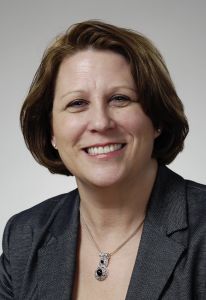
In this feature ATE Central continues our "I Am ATE" series, which showcases an ATE PI, staff member, industry partner, or other ATE stakeholder. We are excited to help spread the word about the wonderful people who are at the core of the ATE community and the innovative work everyone is doing.
Name: Donna Lange
Title: Associate Professor / PI & Center Director, DeafTEC: Technological Education Center for Deaf and Hard-of-Hearing Students
Institution: Rochester Institute of Technology
Center Name: DeafTEC: Technological Education Center for Deaf and Hard-of-Hearing Students
URL: https://deaftec.org
ATE Central: How did you become involved with ATE?
Lange: My first grant with ATE was in 2000 while I was chair of the Applied Computer Technology department at the National Technical Institute for the Deaf (NTID), a two-year technical college for deaf and hard-of-hearing students, and one of the nine colleges of the Rochester Institute of Technology in Rochester, NY. At that time, we were looking for funding to support an information technology workforce development project. It was the NTID's grants coordinator who found the solicitation for the ATE program and encouraged us to submit a proposal. We are so grateful to have found ATE and have been part of the community ever since.
ATE Central: Tell us about the goals of your project or center.
Lange: In 2011, after eleven years of several successful ATE funded projects, we were awarded an ATE National Center of Excellence, DeafTEC: Technological Education Center for Deaf and Hard-of-Hearing Students which is currently in its first year as a resource center.
The goal DeafTEC is to increase the number of deaf and hard-of-hearing (deaf/hh) individuals in highly skilled technician jobs in which there continues to be underrepresentation and underutilization of such individuals in the workplace.
To achieve this goal DeafTEC is providing resources to: (1) advance the career self-efficacy and career awareness of deaf/hh high school and college students related to STEM technician careers, (2) improve access to learning for deaf/hh high school and community college students in STEM classrooms, (3) improve access to learning for student veterans with hearing loss in STEM programs at community colleges, and (4) raise employers' awareness of deaf/hh individuals as an untapped pool of skilled technicians and how to hire, onboard, and create an inclusive work environment for these individuals.
ATE Central: What are some of the most valuable partnerships you've engaged in as part of your ATE related work?
Lange: "We are building this together" is the motto we used while establishing DeafTEC. Partners are at the core of DeafTEC and have been essential to our success.
It has been such an amazing experience meeting, collaborating, and working closely with education and industry leaders across the country. Our network of partner high school teachers, community college faculty, and employers have been actively engaged in creating more inclusive educational and workplace environments to improve the access to technician education and employment for deaf/hh students. Below are examples of some of our most valuable and successful partnerships.
Regional Partnership Model. The DeafTEC regional partnership model among high schools, community colleges, and industry was established in California, Florida, Texas, and the Midwest, four regions of the country with the highest deaf/hh population. The goal of this partnership model was to build a mutually supportive professional community in these regions that improved access to technological education and employment for deaf/hh students. This train-the-trainer model involved personnel from each regional partner, who attended professional development activities that prepared them to offer four DeafTEC workshops. The trainers then offered workshops to high school teachers, community college faculty, and employers within their regions. Our partners also offered STEM events and activities for deaf/hh middle school, high school, and community college students and their parents.
STEM Dual Credit Program. DeafTEC's national STEM dual credit program, Project Fast Forward, partners with high schools in 25 states across the country to offer STEM college courses to their deaf/hh students.
Project Good to Go: Teaching Student Veterans with Hearing Loss. DeafTEC partnered with community colleges in California with large student veteran populations to develop resources and offer professional development on best practices for teaching student veterans with hearing loss in STEM programs.
ATE Central: Could you share a bit about how you've collaborated with others within ATE?
Lange: I have collaborated with others within ATE in a number of ways. I have served on advisory boards for ATE projects, co-presented or participated on panels with other ATE PIs at national conferences, served on the planning committee for the ATE PI conference, and collaborated with PIs on a variety of grant proposals.
I currently serve on the HI-TEC executive committee and chaired the 2017 conference. I am also a sub-awardee PI on the AccessATE project.
ATE Central: What's your favorite food?
Lange: I have many — seafood, NYC pizza, chocolate, and ice cream!

 Subscribe
Subscribe


 See More ATE Impacts
See More ATE Impacts

Comments
There are no comments yet for this entry. Please Log In to post one.